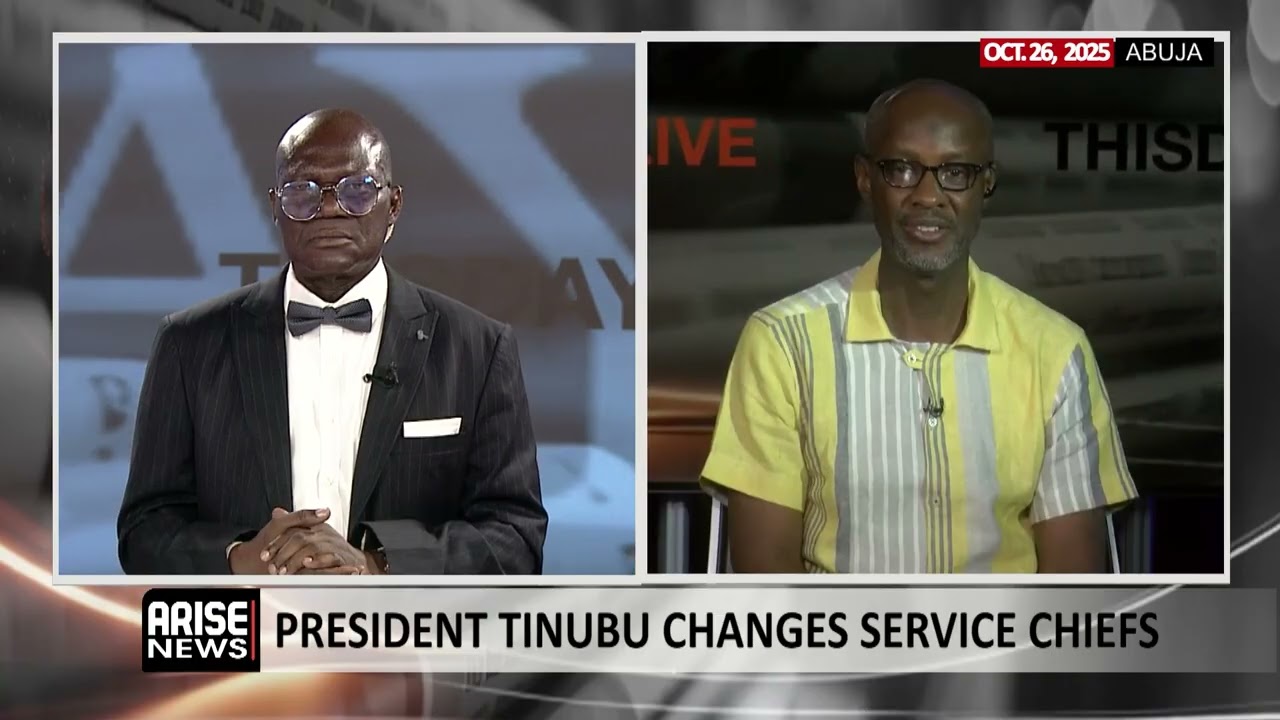
Security and policy analyst Dr. Kabir Adamu says President Bola Tinubu’s decision to reshuffle Nigeria’s service chiefs will not, on its own, transform the country’s security architecture unless it is accompanied by broader institutional reforms and effective coordination across all security agencies.
Speaking on ARISE News on Sunday, Dr. Adamu explained that while the President acted within his constitutional powers to replace the service chiefs, the timing of the move — coming shortly after rumours of a coup attempt — has generated significant discussion both within and outside the military.
“Ordinarily, this would not be an issue of much conversation because the President exercised his right,” he said. “The terms and conditions of service state that the tenure should elapse after a minimum of two years and a maximum of four years. Those removed have served up to the minimum, so the President was at liberty to make changes.”
He noted, however, that “the change came on the heels of rumours of a coup attempt” following reports of military officers being arrested and public events cancelled during Nigeria’s National Day celebrations.
“We’ve seen several reports, some in open sources and others not so open, indicating that there were indeed such attempts,” he added. “That’s why this reshuffle has generated a lot of conversation, especially among the diplomatic community.”
Dr. Adamu also highlighted the ethnic and political sensitivities around the appointments, pointing out that although the three major ethnic groups are represented, “the fact that the Chief of Defence Staff shares the same ethnic identity as the President has evoked further discussion.”
He said the Presidency’s statement that the appointments aim to “strengthen the national security architecture” has sparked debate about whether the changes are more cosmetic than substantive.
“Nigeria’s main security challenges are internal,” he said. “If you look at Section 217 of the Constitution, only one aspect of the military’s function concerns internal security — and that’s in support of civil authorities. So the question people are asking is why only the military leadership was changed, not the heads of agencies directly responsible for internal security.”
The analyst added that up to 100 generals could retire following the reshuffle due to seniority rules within the armed forces.
On expectations from the new service chiefs, Dr. Adamu said structural reform, not routine rotation, is what will determine success.
“There are 29 ministries, departments and agencies that make up what I prefer to call the national security enterprise,” he explained. “The military represents at best only five. It is not logical to expect five out of 29 to do the work of the entire 29. We must look more closely at the coordinators — the National Security Adviser, the Ministers of Defence, Police Affairs, and Interior — and introduce accountability, performance measurement, and regular National Security Council meetings.”
He added that unless Nigeria strengthens oversight and coordination, “I don’t expect any miracles.”
On expected outcomes, Dr. Adamu said the burden now lies heavily on the new security heads.
“The weight of the Nigerian people is on their shoulders,” he said. “With elections coming in 2027, the insecurity level must be contained. There is already a presidential directive to achieve this by December 2025.”
He noted that at least six terrorist groups are currently active across different regions of Nigeria, with three in the northeast, two in the northwest, and others in the north-central zone.
“Their immediate task is to contain these threats and create an environment conducive for governance and elections,” he added.
On the removal of former Chief of Defence Staff, General Christopher Musa, Dr. Adamu said he was among those surprised by the decision.
“I thought he was doing a great job,” he said. “He emphasised interoperability, synergy, and managed internal challenges within the military. His constant media appearances, however, were viewed by some as inappropriate for his position, and there were disagreements over the government’s peace pacts with bandits — which he opposed as a professional.”
Despite the differences, Dr. Adamu described General Musa as “a dignified and respected officer who carried out his duties professionally and leaves behind a positive legacy within the military establishment.”
Boluwatife Enome

